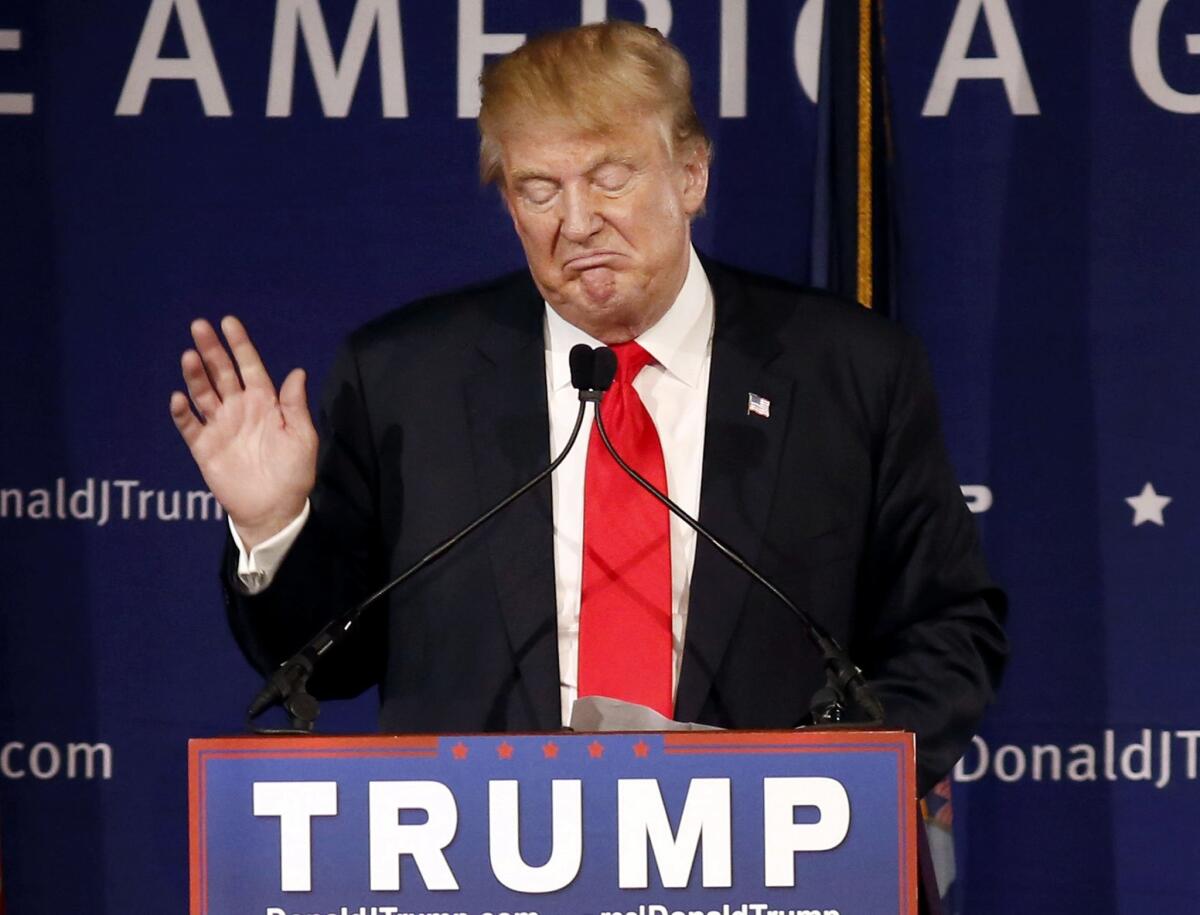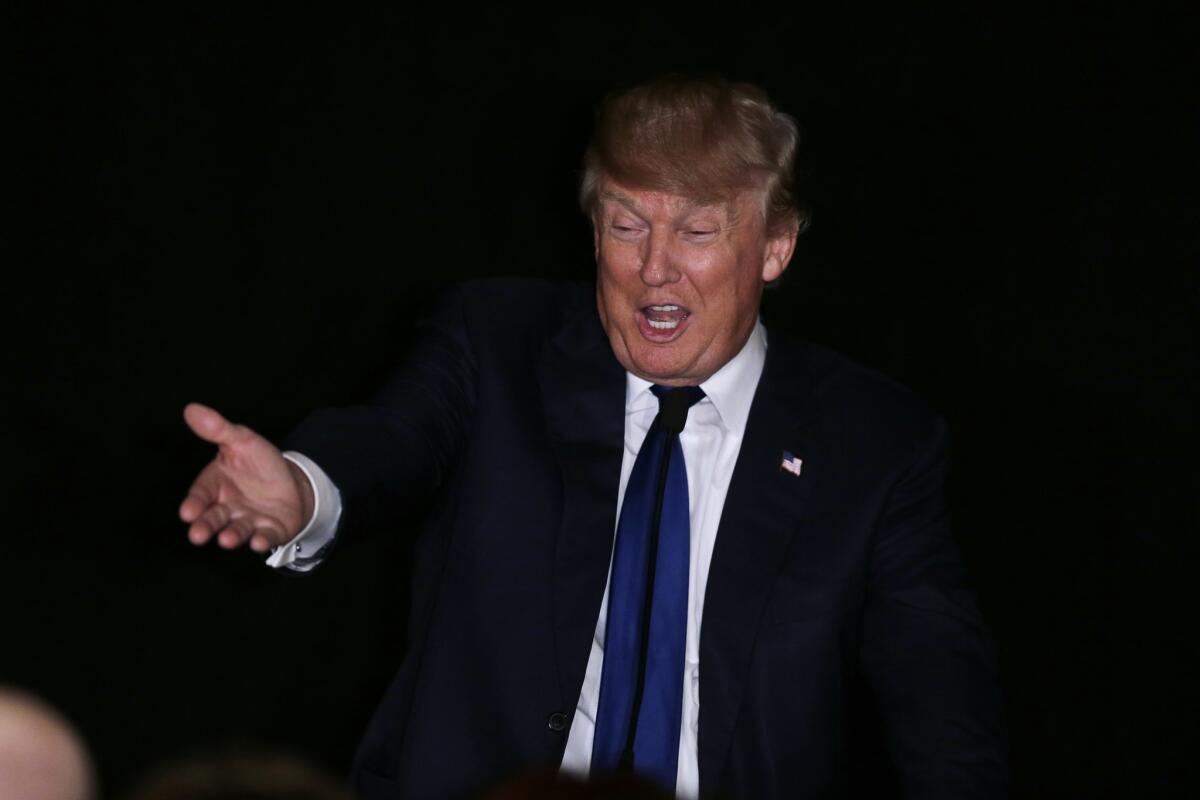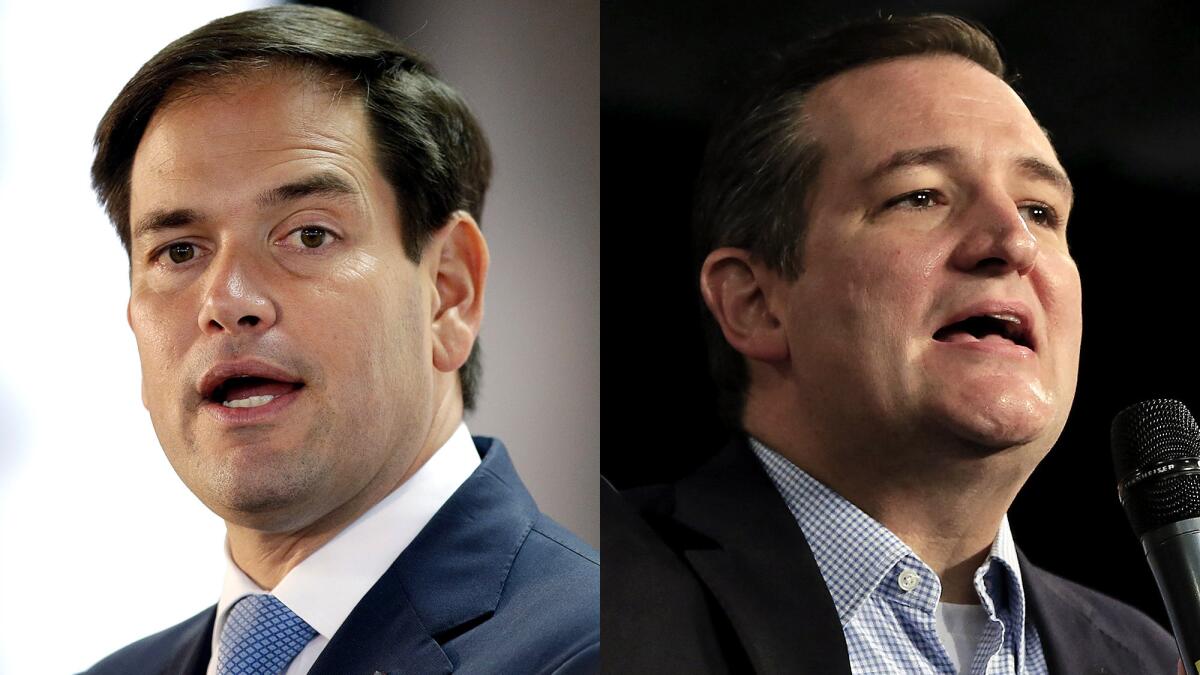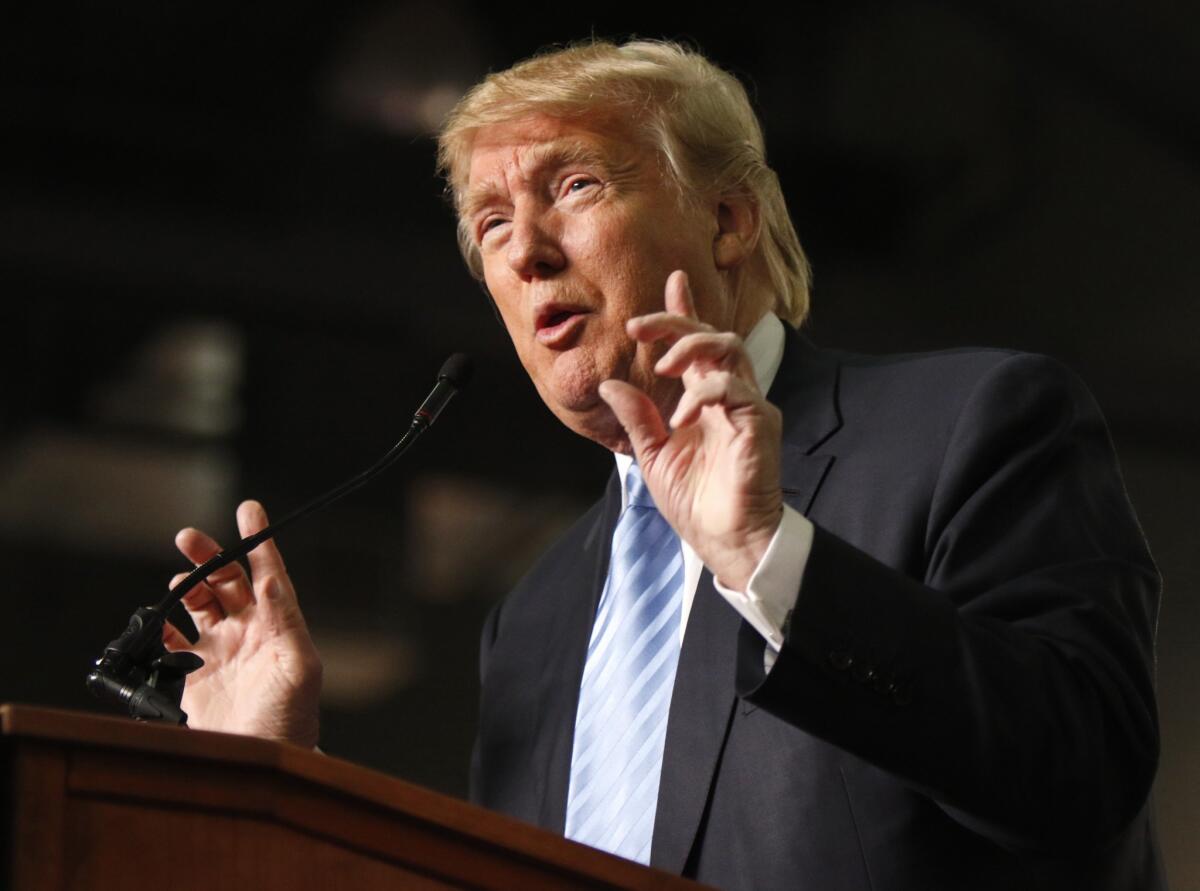Scuffles erupt at Trump rally in Las Vegas
- Share via
By the numbers
Welcome to Trail Guide, your host through the wilds of the 2016 presidential campaign. It's Monday, Dec. 14, and here's what we're talking about:
- In Las Vegas, scuffles erupt at a Donald Trump rally.
- Trump's plan to bar Muslims from entering the U.S. wouldn't necessarily be illegal, experts say.
- Trump's doctor says he's in great health.
- Even being called a "maniac" can't get a rise out of Ted Cruz.
- Hillary Clinton is building up her lead in Iowa, thanks to the end of Joe Biden's long summer of contemplation .
- Cruz and Marco Rubio battle to be the voice of Generation X Republicans, The Times' Noah Bierman reports.
- A new poll shows Cruz surging in Iowa.
Scuffles erupt at Trump rally in Las Vegas
Protesters repeatedly interrupted Donald Trump during a campaign rally tonight, creating a tense atmosphere on the eve of a Republican debate scheduled here Tuesday.
Trump was shouted at by demonstrators yelling "black lives matter!" as they were ushered out by security and confronted by Trump supporters.
In a video of the event, punches and kicks are exchanged between demonstrators and those in attendance at the rally.
"Light that [expletive] on fire," one person can be heard saying as an African American demonstrator sat on the ground and was pulled up by security.
A Secret Service agent joined a Trump campaign aide in blocking reporters from leaving a media pen to report on the scuffles. Trump is one of several candidates with Secret Service protection.
At a rally last week in Iowa, Trump urged a crowd to be gentle with protesters as security led them outside. But on Monday night, Trump did not discourage aggressive treatment of those disrupting him.
“Get him out of here, please,” Trump said as supporters shouted down a heckler being led away by security.
Demonstrators and supporters clash at Trump rally
Bernie Sanders attacks Hillary Clinton on 'regime change'
As economic populist Bernie Sanders struggles to build momentum for his White House bid at a time when voter attention is focused on national security and the threat of attacks at home, the Vermont senator is preparing to lean into the new dynamic with an aggressive critique of Hillary Clinton’s foreign policy record.
Asked what he’s planning for Saturday’s Democratic debate in New Hampshire, Sanders talked not of the big contributions that Clinton accepts from Wall Street, or a plan to break up the big banks that he deems inadequate, but of her track record on diplomacy.
Talking to reporters at a campaign stop in Salem, N.H., on Monday, Sanders characterized Clinton as a champion of ill-advised regime changes abroad, which he says have led to unintended consequences that made Americans less safe.
“I voted against the war in Iraq – I think much of what I feared would happen did happen,” he said. Clinton, of course, voted in favor of invading in 2003, a vote she now says she has come to regret.
“I am not sympathetic to what we have done in recent years regarding regime change in Libya,” Sanders said, a reference to Obama administration policies that were set in motion when Clinton was the nation’s top diplomat. “It's easy to get rid of a government; it's much harder to deal with what happens the day after, and who fills that void.”
Sanders went on. “We're seeing Libya now becoming a real haven for ISIS, so I think there are real differences as to how we might be dealing with ISIS and how we destroy ISIS between the secretary and myself," he said, using an alternate name for Islamic State.
Hillary Clinton says GOP gets it wrong on immigration
Hillary Clinton drew rousing applause from some 1,300 supporters of immigration reform on Monday evening, as she vowed to remain steadfast in support of their cause at a time GOP candidates are aggressively moving in the other direction.
As Clinton addressed the group on the eve of the next GOP debate, she talked about her personal experiences with young immigrants who were brought to the U.S. illegally as children, known as Dreamers. The crowd erupted in cheers as Clinton announced that one such Dreamer, Lorella Praeli, who is her director of Latino outreach, will be sworn in as a U.S. citizen Tuesday by President Obama.
“Lorella’s story, like so many other American stories, reminds us of who we are as a people,” Clinton said in her address to the National Immigrant Integration Conference in New York. Clinton met privately before the event with a family of immigrants at risk of being pulled apart by current laws, including two members of the family who are Dreamers.
Clinton attacked her GOP rivals, whose collective posture toward immigrants has grown increasingly harsh in the aftermath of recent terrorist attacks. She said none of the Republicans support a path to citizenship for undocumented immigrants, and she called their rhetoric “mean-spirited.”
“I disagree with those who say, ‘Make America Great,’” Clinton said, a reference to the campaign slogan of Donald Trump, who wants to ban Muslims from entering the country and who also recently defended the internment of Japanese-Americans during World War II. “We are great, and we are going to stay great.”
“We are hearing all kinds of anti-immigration sentiment in the news right now,” Clinton said. “Candidates for president are calling immigrants drug runners and rapists. They promise if elected to ... deport millions of people … after the terrorist shootings in San Bernardino. At a time when lots of Americans are fearful of an attack here at home, some candidates are even stoking those fears more.”
How Donald Trump's plan to ban Muslim immigrants could hold up

Some legal scholars note that Donald Trump’s proposal to ban Muslims from entering the U.S., however controversial, could pass legal muster.
Donald Trump's attention-getting proposal for a “total and complete shutdown of Muslims entering the United States” struck many as blatantly unconstitutional because it discriminates against a class of people based on religion and punishes even those who have done nothing wrong.
When applied to Americans, such a policy would almost certainly violate constitutional guarantees of “due process of law” and “equal protection.”
But legal scholars note that immigration law is different, and Trump’s ban, however controversial, could actually pass legal muster.
Could Ohio block a Trump 3rd party bid? Not so fast

Republican front-runner Donald Trump meets with police union members in Portsmouth, N.H., on Thursday.
Donald Trump has repeatedly issued thinly veiled threats to run as a third-party candidate for president if he decides Republicans have not treated him fairly.
Monday, one prominent Republican -- Ohio's top election official -- suggested his state would try to block any such effort.
That statement by Jon Husted, Ohio's secretary of state, represents good news to the other Republican candidates. If one of them beats Trump for the nomination, he or she would almost certainly need to win Ohio to gain the White House.
A third-party bid by Trump would make carrying the state much harder for any GOP nominee.
But Husted, who made a similar statement in August, when Trump first took part in a Republican candidate debate, makes the law sound a lot simpler than it really is.
Ohio, like many states, has a "sore loser" law designed to keep a candidate who loses a primary from running in the general election. But whether those laws fully apply in presidential contests has long been a contentious issue. In 1980, for example, John Anderson won a Supreme Court challenge against an earlier version of Ohio's law and got on the state's ballot for his third-party bid.
Husted's statement does underscore one undisputed fact, though: If Trump decides to run an independent or third-party race, he'll be spending a lot of money on lawyers.
Donald Trump's doctor sounds a lot like Donald Trump
The physician for Republican front-runner Donald Trump said in a statement that the candidate has had "no significant health problems" and even that his lab results are "astonishingly excellent." Which sounds much like Trump's own boasts about how "terrific" or "fantastic" his various ideas are.
Ted Cruz and Marco Rubio are fighting to own what it means to be a Generation X Republican.

Republican presidential candidates Marco Rubio, left, and Ted Cruz are in the second tier of GOP contenders, according to a new USC Dornsife/Los Angeles Times poll.
Edging closer to Donald Trump at the top of the crowded Republican presidential field are two men with remarkably similar biographies: first-term senators in their mid-40s from large Sun Belt states, born five months apart to Cuban American families and propelled into the Senate by tea party rage.
Sens. Marco Rubio of Florida and Ted Cruz of Texas are presenting themselves as a hard break from the past, not only contrasting themselves with President Obama but also with the Republican Party of the Bushes.
Yet even as each vies to become the first Generation X president, they represent sharply different views of what that should mean.
Casino workers view Trump and Clinton as best understanding their industry

FILE - In this Sept. 30, 2015 file photo, people look at slot machines at the Ballys Technology booth during the Global Gaming Expo in Las Vegas. The gambling industry is trying to attract younger players to the casino floor to revive revenues that have sagged in recent years. (AP Photo/John Locher, File)
Nevada’s casino workers are closely watching the presidential race, according to an industry survey released before Tuesday’s GOP debate in Las Vegas, and they see Republican front-runner Donald Trump and Democrat Hillary Clinton as best understanding their home-state industry.
The poll, by the American Gaming Assn., comes as the trade group reminds candidates that what happens in Las Vegas doesn’t necessarily stay in Vegas anymore. The group is warning candidates that any tough talk against gambling will follow them on the campaign trail.
Almost 40 states nationwide have casinos. Nevada’s casino workers, who make up 15% of the state's electorate, are most concerned about jobs and the economy in the boom-or-bust Silver State. Nearly 40% said they would withhold their vote from candidates “bashing” the industry, the survey said.
Republican Chris Christie of New Jersey, home to another major casino town in Atlantic City, came in third in the survey, and the other candidates trailed.
The gaming association is inviting candidates for back-of-house tours learn about the industry and meet with workers as they stump for votes.
Hillary Clinton widens the gap in Iowa
With time running out for her rivals to catch her, Hillary Clinton is gaining momentum in Iowa.
And she has Vice President Joe Biden to thank.
A new Des Moines Register/Bloomberg poll shows that 48% of the likely participants in the state’s Feb. 1 Democratic caucuses now plan to vote for Clinton. The next closest competitor, Vermont Sen. Bernie Sanders, has the support of 39% of caucus-goers. Clinton has nearly doubled her lead over Sanders since October, when she was five points ahead of him.
A lot has changed for Clinton since then, when her campaign was struggling to contain the controversy around her use of a private server in her home for government email and she was called to testify before the House Benghazi Committee. But the biggest difference between then and now may have been that Biden was still considering running.
When he decided not to run, the candidate who benefited the most in Iowa, according to the poll, was Clinton. She jumped up six points in the Register’s first poll since Biden made his decision. Sanders gained two points, as did former Maryland Gov. Martin O’Malley, who is failing to gain much traction with Iowa voters, despite spending considerable amounts of time in the state. Just 4% of caucus goers say O’Malley is their first choice.
Trump prods Cruz, but to no avail
Texas Sen. Ted Cruz is so far refusing to take the bait from GOP presidential contest rival Donald Trump, skipping a direct response to Trump's recent provocative comments about him.
In a Sunday interview with Fox News, Trump described Cruz as a “maniac” in regard to the Texas senator’s record of supporting legislation not always in line with the Republican Party's wishes.
Cruz’s response — a bit of '80s humor:
Cruz appears to be trying to deflect any conflict to preserve his chances with Trump's supporters should the real estate magnate ever leave the race. Other GOP candidates have welcomed the chance to denounce and indulge in battles with the businessman, though.
On Friday, Trump responded to reports that Cruz questioned the electability and judgment of Trump and retired neurosurgeon Ben Carson.
Not only is Cruz rejecting what he labels media efforts to incite a feud between him and Trump, he doesn’t necessarily need the attention a feud might draw. He climbed to first in a new Des Moines Register/Bloomberg Politics poll released Saturday, 10 percentage points above second-place Trump.
Iowa Rep. Steve King, a Cruz supporter, told CNN on Monday why he believes Cruz will veer from a fight.
"There's never been any wisdom in taking on Donald Trump and starting a fight with him," he said.
CNN releases podium order for the GOP debate
Nine candidates made it on to the main stage in Las Vegas for Tuesday’s fifth GOP presidential primary debate. CNN will host businessman and current front-runner Donald Trump, retired neurosurgeon Ben Carson, Texas Sen. Ted Cruz, Florida Sen. Marco Rubio, former Florida Gov. Jeb Bush, businesswoman Carly Fiorina, New Jersey Gov. Chris Christie, Ohio Gov. John Kasich and Kentucky Sen. Rand Paul. Wolf Blitzer of CNN will moderate.
Here is the order of the podiums, as decided by CNN:
These four candidates — former Arkansas Gov. Mike Huckabee, former Pennsylvania Sen. Rick Santorum, South Carolina Sen. Lindsey Graham and former New York Gov. George Pataki — will join in the first debate Tuesday.
Five things from the 2016 campaign to get you caught up from the weekend

Republican presidential candidate and golf course owner Donald Trump speaks in Columbus, Ohio, on Nov. 23, 2015.
It was a busy weekend on the 2016 campaign trail, so here are some items to get your week started.
-- Texas Sen. Ted Cruz surged ahead of Donald Trump in Iowa as caucus-goers prepare to kick off the 2016 presidential election in February.
-- The main debate stage is set for Tuesday night in Las Vegas.
-- Marco Rubio dismissed Trump's proposal to ban Muslims from entering the country as an attempt to regain the "limelight."
-- Trump continues to hint at the possibility of a third-party run.
-- Bernie Sanders offers some blunt analysis to Iowa volunteers.
By the numbers
Get the L.A. Times Politics newsletter
Deeply reported insights into legislation, politics and policy from Sacramento, Washington and beyond. In your inbox three times per week.
You may occasionally receive promotional content from the Los Angeles Times.







